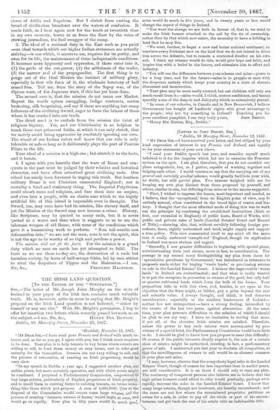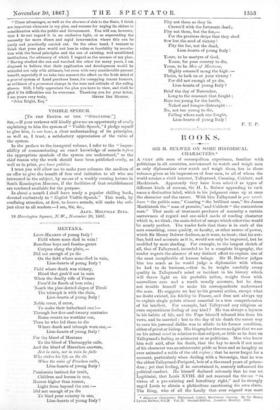[LETTER TO JOHN BRIGHT, ESQ "Dublin, 10 Ifountjoy Street, November
12, 1867.
" MY DEAR have received your letter, and feel obliged by your kind expression of interest in my Prussia and Ireland and equally so for your statement of your own views.
"I read your Dublin speech last year, and consider myself much indebted to it for the impulse which led me to examine the Prussian system on the spot. I am glad, therefore, that you do not consider our plans antagonistic, but, as I gather, capable of working together and helping each other. I would venture.to say that the carrying out of my general and certainly gradual scheme, would greatly facilitate your wide, no doubt, but still special plan. Two reasons weighed with me for keeping my own plan distinct from thoso proposed by yourself, and others, similar in aim, but differing from mine as to the means suggested.
"First, I wished to impress the lesson, most important and needed, as I believe, that the 'exceptional,' from an English point of view, may be entirely normal, when considered in the broad light of reason and his- tory. I thought that tho most effectual mode of doing this was to work out the principle by combining the established institutions (Irish at first, now extended to England) of public loans, Board of Works, with public and private sales of lands (Landed Estates' Court and Record of Title),—showing, also, that, without servilely following foreign pre- cedents, these, rightly understood and used,•might supply and support a true policy. This view commended itself to my mind all the more that it really embraced `exceptional' England, though its application to Ireland was more obvious and urgent.
"Secondly, I saw greater difficulties in beginning with special plans, notwithstanding their just claims, more or less, to consideration. The passage in my second essay distinguishing any plan from those for speculative purchases by Government,' was introduced in reference to proposals made either for buying waste lands,' or purchasing estates on sale in the Landed Estates' Court. I believe the improveable waste lands' in Ireland are overestimated ; and that what is really wanted is to put the occupiers in possession as owners of the good, but only half or quarter cultivated lands which form the bulk of the farms. Your proposition falls in with this view, and, besides, is not open to the objection that the State might, as bidder, pay a price beyond the real and saleable value. I always thought, and think, it well deserves consideration ; especially as the resident landowners Of Ireland— neither few nor unimportant—have a strong feeling, intensified by the events of the last two years, against absenteeism. At the same time, your plan ?resents difficulties to the solution of which I should be glad to see my way. I have no hesitation in stating that most, if not all, of the absentee Irish estates are entailed. Therefore, unless the power to buy such estates were accompanied by pro- visions of a special kind, the Parliamentary Commission would have little to do. I should be glad to know how you propose to meet this difficulty. Of course, if the public interests clearly require it, the sale of a certain class of estates might be authorized, creating, in fact, a parliamentary power of sale. I understood you last year to disclaim all compulsion, so that the unwillingness of owners to sell would be an element common to your plan and mine.
"I may, however, observe that the compulsory legal sales in the Landed Estates' Court, though of course far less important than in earlier years, are still considerab'e. It is on these I should rely to start my plan. The testimony of competent persons also induces me to believe that the high prices farmers could afford to offer would gradually, perhaps even rapidly, increase the sales in the Landed Estates' Court. I know that many large estates, though not insolvent, are heavily encumbered ; and the cases are not few where the encumbered proprietor petitions as owner for a sale, in order to pay off the whole or part of his encum- brances, and get back the rest of his estate with an indefeasible title. "These advantages, as well as the absence of risk to the State, I think are important elements in my plan, and reasons for urging its claims to consideration with the public and Government. You will see, however, that 'I do not regard it in an exclusive light, or as superseding the necessity for more direct and rapid intervention where this can be justly and practically carried out. On the other hand, I venture to think that your plan would not lose in value or feasibility by associa- tion with the broad principles and the use of existing, well established institutions, the advocacy of which I regard as the essence of my plan. "Having studied the one and watched the other for many years, I mu disposed to believe that their application and development would be attended not only with ultimate, but even with very considerable present benefit, especially if we take into account the effect on the Irish mind of a general system of Land purchase loans, for occupying tenant farmers, as evidence of a permanent change in the tone and attitude of the ruling classes. Still, I fully appreciate the plan you have in view, and shall be glad if its difficulties can be overcome. Thanking you for your letter,



































 Previous page
Previous page